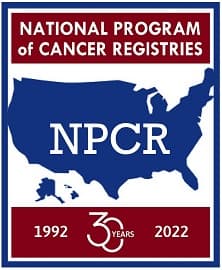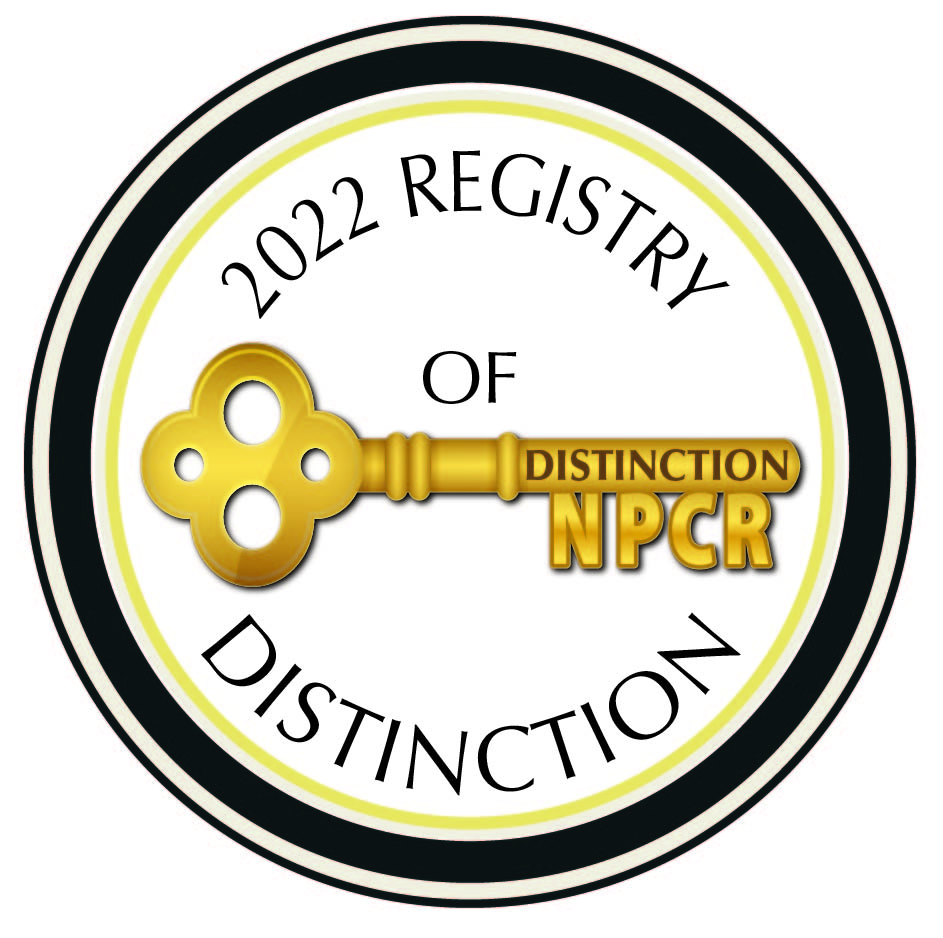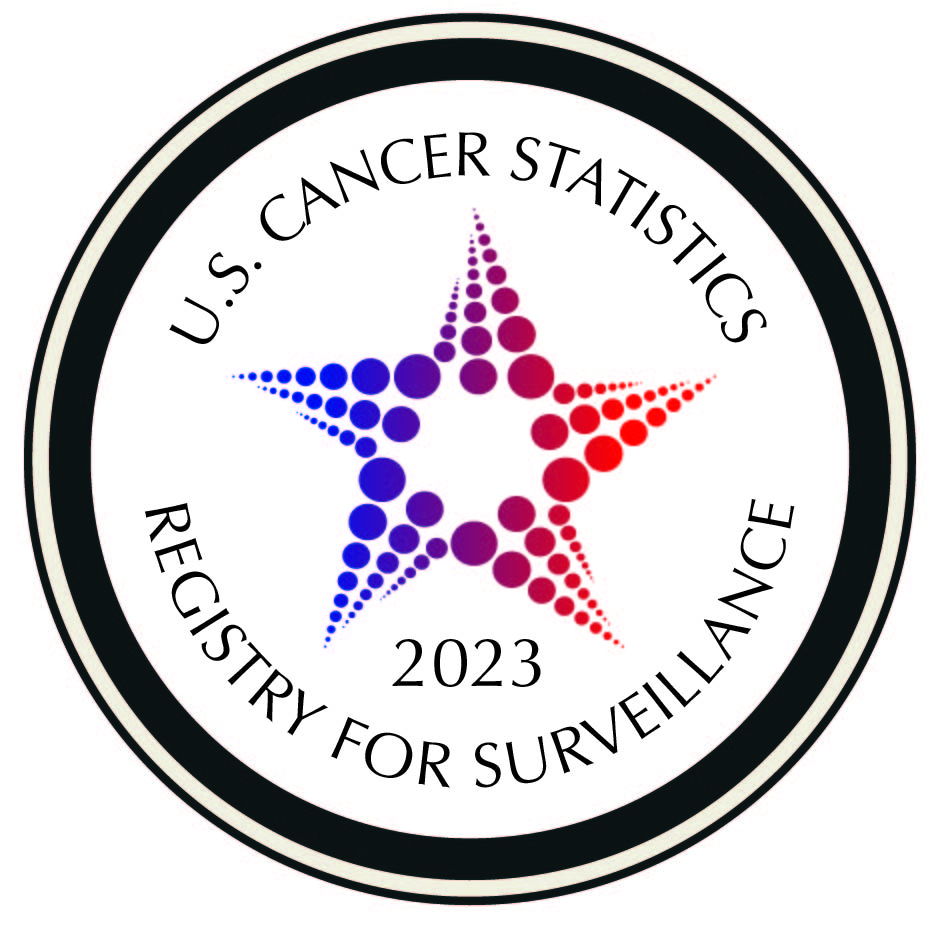
SOUTH DAKOTA CANCER REGISTRY
The South Dakota Cancer Registry (SDCR) is a statewide population-based cancer registry. It collects data on cancer incidence and reports on cancer incidence and mortality. It began in 1992 as a limited cancer data collection system that monitored cancer incidence through pathology reports and reports from hospital tumor registries approved by the American College of Surgeons. In 2005 a law passed requiring reporting by all entities detecting, diagnosing and treating cancer cases in South Dakota.

In 2001, the SDCR became part of the National Program of Cancer Registries (NPCR) which supports central registries in 45 states, the District of Columbia, and the territories of Puerto Rico, the Republic of Palau, and the Virgin Islands. It is notable that the NPCR registries collect information on cancer cases accounting for up to 98% of the U.S. population.
The NPCR is administered by the Centers for Disease Control and Prevention which provides funding for states to implement statewide population-based registries and to enhance existing registries to meet national standards for completeness, timeliness and data quality. The SDCR meets this standard which allows the inclusion of high-quality South Dakota cancer data in national statistics. To view, please see http://www.cdc.gov/cancer/npcr/ for the United States Cancer Statistics publication and CDC Wonder, an online query system.
The SDCR voluntarily participates as a member of North American Association of Central Registries (NAACCR). The SDCR also meets NAACCR’s national standard which allows for cancer data inclusion in Cancer in North America (CINA) publications.
News
- The South Dakota Cancer Registry (SDCR) has achieved national recognition from CDC’s National Program of Cancer Registries as a Registry of Distinction and the Gold Standard Certification from the North American Association of Central Cancer Registries for the 2022 Call for Data. Certification measures for excellence in the areas of completeness of case ascertainment, quality of data, and timeliness. In conjunction with the achievement, South Dakota cancer data will be published soon in the Cancer in North America 2016-2020 CINA and the newly released United States Cancer Statistics USCS.



- 2022 Success Story
The South Dakota Cancer Registry is reflected in the Office of Health Promotion 2020 Strategic Map - the vision is that all South Dakotans will enjoy healthy lives free from the devastation of chronic diseases.
STATUTE & ADMINISTRATIVE RULE
Under South Dakota statute, cancer is a reportable disease for all hospitals, physicians, physician assistants, nurse practitioners, nurse midwives, pathology laboratories, and free-standing radiology centers that detect, diagnose and treat cancer cases in the state.
REPorTABLE CANCERS
All in situ and malignant neoplasms are considered reportable to the South Dakota Cancer Registry. The database includes all cases of carcinoma, sarcoma, melanoma, lymphoma, and leukemia diagnosed by histology / cytology, radiology, laboratory testing, clinical observation, autopsy, and certifier on death certificate.
Also reportable are benign tumors of the brain, central nervous system, meninges, pineal gland, or pituitary gland.
Basal and squamous cell carcinomas of non-mucoepidermoid sites of the skin are not reportable.
Invasive cancer of the cervix is reportable, but in situ cervix cases are not.
DATA & PUBLICATIONS
Each year in South Dakota there are an estimated 4,000 new cancer cases and 1,600 deaths. Each day on average, 10-11 South Dakotans are diagnosed with cancer and four die from the disease.
South Dakota Cancer Monographs
Data Search Engines
FAQ
Frequently Asked Questions
What is the SDCR?
The South Dakota Cancer Registry (SDCR) is South Dakota's statewide cancer surveillance system. The data are used to monitor cancer trends, target cancer control and prevention programs, provide a research base for studies into cancer causes and ultimately to reduce death and illness due to cancer.
What kind of cancer cases are reported?
All malignant cancers must be reported to SDCR. All cancer cases diagnosed and/or treated in South Dakota since January 1, 2001 must be reported to the registry. Benign brain and central nervous system tumors diagnosed and/or treated since January 1, 2004 must be reported. For specific detail about reporting requirements, see SDCL 1-43-11 through 1-43-18 and ARSD 44:22.
What kind of data is collected?
For each cancer case diagnosed or treated in South Dakota, the registry collects data including diagnosis, stage of disease, medical history, patient demographics, laboratory data, tissue diagnosis and radiation, and surgical or other methods of diagnosis or treatment.
Cases are reported electronically. The SDCR provides free internet abstracting software that meets the requirements for reporting of cancer cases. SDCR follows national standards to assure consistency in case reporting from facility to facility.
Who is required to report cancer cases?
State law, SDCL 1-43-14, requires licensed hospitals, physicians, physician assistants, nurse practitioners, nurse midwifes, pathology laboratories, and free-standing radiology centers that detect, diagnose, or treat cancer South Dakota to report to the SDCR.
Who does the actual data collection?
Data collection, or abstracting, is performed by specially trained personnel. Currently, Certified Tumor Registrars (CTRs) abstract most of the cancer cases in the state. Other data collection personnel are trained by SDCR or though other recognized training programs. SDCR offers training for incidence abstracting as needed.
What about patient confidentiality?
SDCR adheres to strict security measures to assure confidentiality of patient and institutional records. Under state law, SDCL 34-14-3, it is a Class I misdemeanor to disclose such records.
Who uses SDCR data? What is it used for?
SDCR data are used by researchers, health planners, epidemiologists, physicians, legislators, medical students and others to:
- Monitor the incidence and mortality of cancer to detect potential public health problems;
- Inform and educate by providing descriptive data on cancer incidence and mortality to health professionals and the general public about risks, prevention, and early detection of cancers known to be elevated in their communities;
- Guide decisions about how to use public-funded cancer control resources by more accurately targeting intervention resources for communities and patients and their families; and
- Respond to public concerns.
Where can I find more information about specific cancers?
Contact the
American Cancer Society or call 800- 4CANCER (800-422-6237).
STAFF CONTACT
Kay Dosch, MA, Certified Oncology Data Specialist (ODS-C), Cancer Registry Coordinator
Morgan Vedvei, MLT (ASCP), Cancer Registry Data Manager
South Dakota Department of Health
South Dakota Cancer Registry
615 E. 4th St.
Pierre, SD 57501-1700
Phone: 605-773-3737
FAX: 605-773-5509
Email:
DOH.INFO@state.sd.us